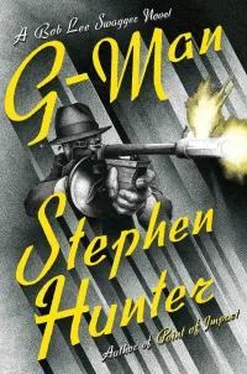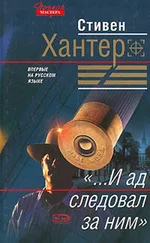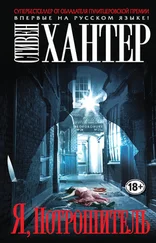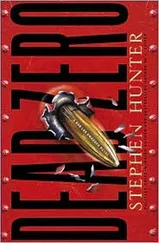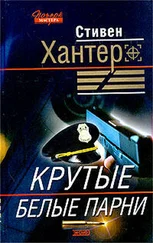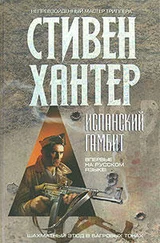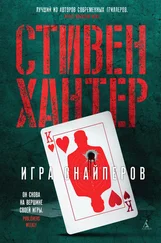Стивен Хантер - G-Man
Здесь есть возможность читать онлайн «Стивен Хантер - G-Man» весь текст электронной книги совершенно бесплатно (целиком полную версию без сокращений). В некоторых случаях можно слушать аудио, скачать через торрент в формате fb2 и присутствует краткое содержание. Жанр: Старинная литература, на английском языке. Описание произведения, (предисловие) а так же отзывы посетителей доступны на портале библиотеки ЛибКат.
- Название:G-Man
- Автор:
- Жанр:
- Год:неизвестен
- ISBN:нет данных
- Рейтинг книги:3 / 5. Голосов: 1
-
Избранное:Добавить в избранное
- Отзывы:
-
Ваша оценка:
- 60
- 1
- 2
- 3
- 4
- 5
G-Man: краткое содержание, описание и аннотация
Предлагаем к чтению аннотацию, описание, краткое содержание или предисловие (зависит от того, что написал сам автор книги «G-Man»). Если вы не нашли необходимую информацию о книге — напишите в комментариях, мы постараемся отыскать её.
G-Man — читать онлайн бесплатно полную книгу (весь текст) целиком
Ниже представлен текст книги, разбитый по страницам. Система сохранения места последней прочитанной страницы, позволяет с удобством читать онлайн бесплатно книгу «G-Man», без необходимости каждый раз заново искать на чём Вы остановились. Поставьте закладку, и сможете в любой момент перейти на страницу, на которой закончили чтение.
Интервал:
Закладка:
“There are folks older than me?”
“—old folks, pick up rumors, memories, old photos. You could read. The libraries have dozens of historical manuscripts that no one has ever looked at. I think it would be fascinating. Plus, you’re good at that. Pattern recognition, smart deductions, re-creating imaginatively what did happen, as opposed to what everyone believes happened. When you’re done, or sort of done, maybe then Reilly would know an actual writer who’d put all the information into prose.”
“It don’t feel right, somehow. I mean, dammit, it doesn’t feel right.”
“You’re scared. Swagger — scared of no man and no force on earth. But scared of this.”
“That’s right. Nothing back there but bad news. But it’s not just my father, Earl. It’s his father, Charles, the sheriff. He’s the mystery. Another gunman. He’s the scary one.”
It was so true. The Swaggers, on back over the years, men with guns. And the men of the last three generations, Charles, his son Earl and his son Bob, they had it in spades and were, each of them, defined by war. Throw in Bob’s son, Ray, now at the FBI, defined by the War on Terror in the world’s brutal sandboxes. That made four straight. They all had it, that Swagger singularity that set them apart, curse or blessing, as circumstances dictated. Who knew where it came from, that odd gift to take a firearm, understand it, and make the first shot count — always.
But it was Charles, the grandfather of Bob, the father of Earl, who was the strangest of them all. He was a hero in the Great War, and came back to Polk and put his skill to work as a deputy and then became the sheriff of the county. But it seemed the man didn’t want anyone knowing his business, anyone poking about. He was solitary, a figure of rectitude and distance, blazing good with the gun but otherwise not a chum, a pal, a buddy, a laugher, a storyteller. He just stood for pure force, and his reputation alone, especially after a 1923 shoot-out with three Little Rock hotshots called the Warrens (final score: the sheriff, 3; the Warren brothers, 0), kept most bad boys out of Polk. Death was too sure a thing at the speedy hand of the sheriff.
But — the stories were unclear, always blurry, ever-shifting — something persisted that carried the information that Charles had turned not just drunk and mean and surly but against the law he enforced. In 1940, there’d been a train robbery in Hot Springs, some real Mob professionals, and they’d simply vanished. Someone who knew the forests — Charles had hunted them his whole life — had to have gotten them out. Did someone have something on him? Was he compromised by criminal interests? It was like an inkblot, a smear, that warned all to stay away.
But if there were civic mysteries encapsulated by his public career, there were even more abiding ones on the family circuit. Why did Bob’s father, Earl, never speak of the old man? Hate, fear, anger, unforgiveness? — it could be anything except indifference. Why’d Earl leave home at sixteen for the Corps? Then there was Bobbie Lee, Bob’s own namesake. Earl’s brother, Charles’s second son, evidently some sort of damaged goods. He hung himself in 1940—almost simultaneously with the train robbery. Why? Was Charles abusing him or was he just so beyond the bend there was no helping him and he himself saw no further point. Why was all this shrouded in mystery? Any small town is a nest of scandal and shame, and this was one of Blue Eye’s juiciest, and yet so powerful, it kept people away seventy-five years later. Was there a truth too terrible to bear?
Swagger decided to put it from his mind. But the past was like a big cat, a black panther, that, having slipped the cage, would not go away. Instead, it haunted the fringes of the property, leaving sign, howling in the night, possibly seen as a dark blur for a second or so when least expected, somehow ominous and waiting at the same time. Invisibly, it prowled, scuffled, left bloodied carcasses about. Bob knew it would come.
It attacked when Bob was riding the rim one morning. A bitter memory leapt from a tree and took him down hard and clawed the wound that never healed, the death of Earl Swagger in 1955. The wound opened, bled, puckered, and hurt like hell. It put in Bob’s head the thing he hated the most: the memory of his father on that last day, pulling out of the farm in his black-and-white, waving at his only son.
How does such a man happen? How can a man contribute so much and demand so little? Where does pure moral strength come from? It doesn’t come from nowhere. As Bob’s character was formed in obedience to his ideal of his father, Bob now saw that Earl’s was formed in a different smithy; he was formed to be the anti-father, the anti-Charles. He ran his life in such a way as he would never end up as that dark figure who haunted it, his father. So, yes, inescapably, everything his father became had to do with the man the sheriff already was.
It all had to do with the sheriff. Who was he? Why was he? He scared Bob.
Then that same afternoon — it had to be coincidence because he was too sane and too old to believe in any system running the universe but brute whimsy — Bob looked in his email and saw something unexpected. From: jvincent@smathersvincentnichols.com.
That was Jake Vincent, his Arkansas lawyer, one of Sam Vincent’s boys, all grown up and made good and partnered up in a fancy law firm in Little Rock.
Jake had represented him on the sale of the land to a big corporation for residential development and he was a fine one for dotting all t ’s and crossing all i ’s. A small fortune had been spent on stamps to get the deal finally done and the money transferred into the Swagger accounts. Jake had done it all, as Bob had no other reason to conclude, superbly.
“Bob,” the email read, “something small and odd has come up involving the property. I don’t feel comfortable discussing it by email or even letter. Can you call me on my private cell tonight?” and he gave the number.
That night, Bob called.
“Jake, it’s me.”
“Ah, right on time. Thanks so much.”
They palavered a bit about recent fortunes, the state of the estate, Arkansas politics, the Razorbacks’ chances in football and basketball, the destinies of their children.
“So anyway, Bob, this odd thing has happened.”
“Go ahead.”
“As your lawyer, let me formally inform you — this is for your protection as well as mine — that some of the information I’m about to give you suggests commission of a federal crime, and if you don’t report it, you could be subject to indictment yourself. It’s probably a long shot, but I’m not earning my money if I’m not telling you that.”
“What kind of law?”
“I’d guess receivership of stolen property.”
God, had Earl been on the take and stowed away a quarter million that had just come to light? Bob wasn’t sure he wanted to know.
“Lord,” he said.
“The objects in question are two. One is a government-property Colt .45 ACP automatic, serial number 157345C. We tracked the number via the Colt Company and it was from a lot that was sold to the Department of the Post Office in 1928, the year of its manufacture. It wasn’t an army gun but a commercial variant, purchased for use in certain law enforcement situations. Now — I don’t know, but somehow it ended up in a tin strongbox that was hidden under the foundation of your old farmhouse. The clear implication is that it was illegally appropriated. It had been very carefully secreted away, God knows when, and after the house came down, the excavator was tearing out the foundation and the bucket caught on the corner of the box and pulled it out of the ground.”
“I sure don’t know nothing about that,” said Bob. “I know my father brought a Thompson back from the war, but after he died, my mother turned it over to the State Police out of fear of legal entanglement. But if it’d been a gun my dad cropped from the Corps — it must have happened to a million .45s in the war—”
Читать дальшеИнтервал:
Закладка:
Похожие книги на «G-Man»
Представляем Вашему вниманию похожие книги на «G-Man» списком для выбора. Мы отобрали схожую по названию и смыслу литературу в надежде предоставить читателям больше вариантов отыскать новые, интересные, ещё непрочитанные произведения.
Обсуждение, отзывы о книге «G-Man» и просто собственные мнения читателей. Оставьте ваши комментарии, напишите, что Вы думаете о произведении, его смысле или главных героях. Укажите что конкретно понравилось, а что нет, и почему Вы так считаете.
